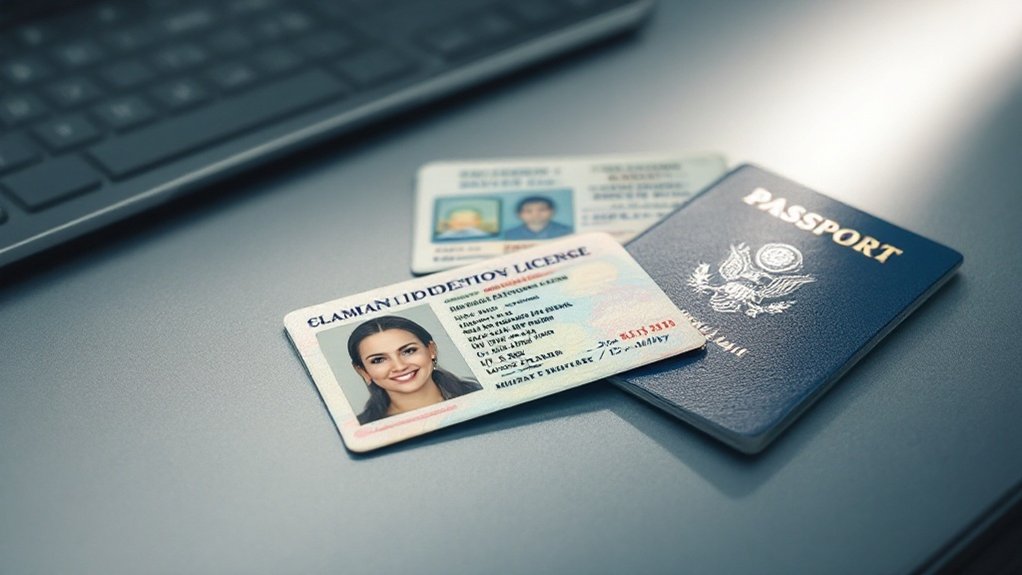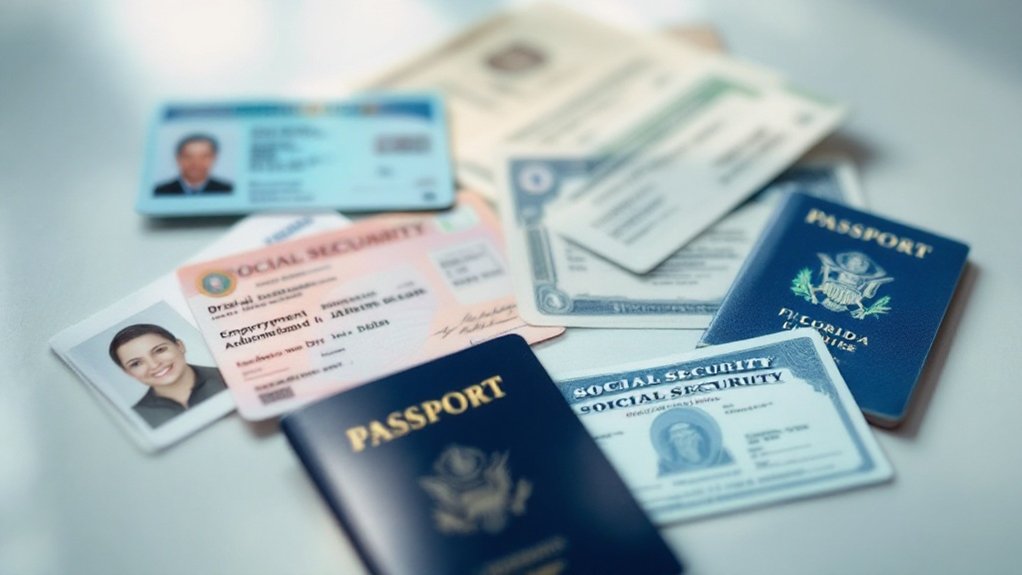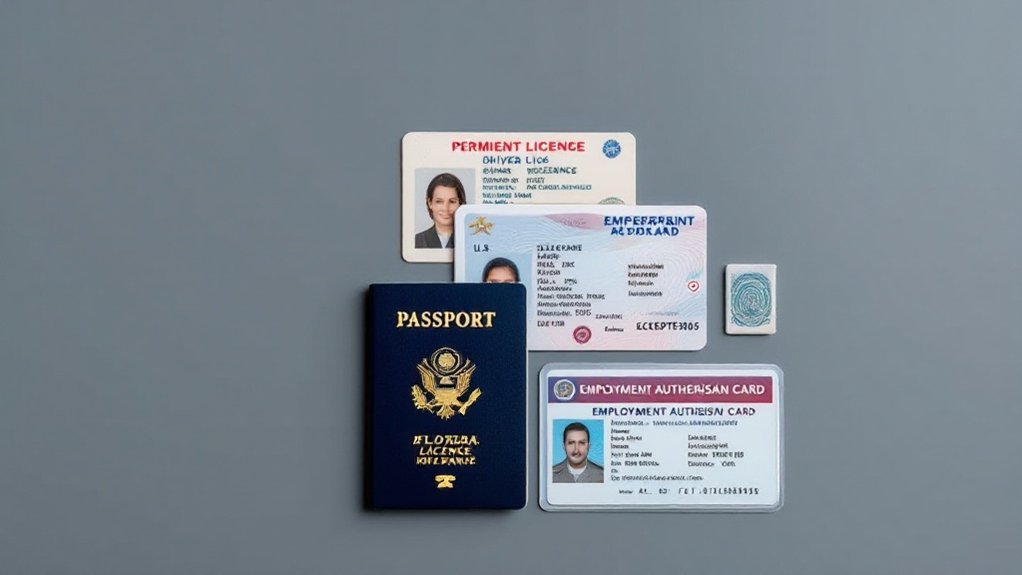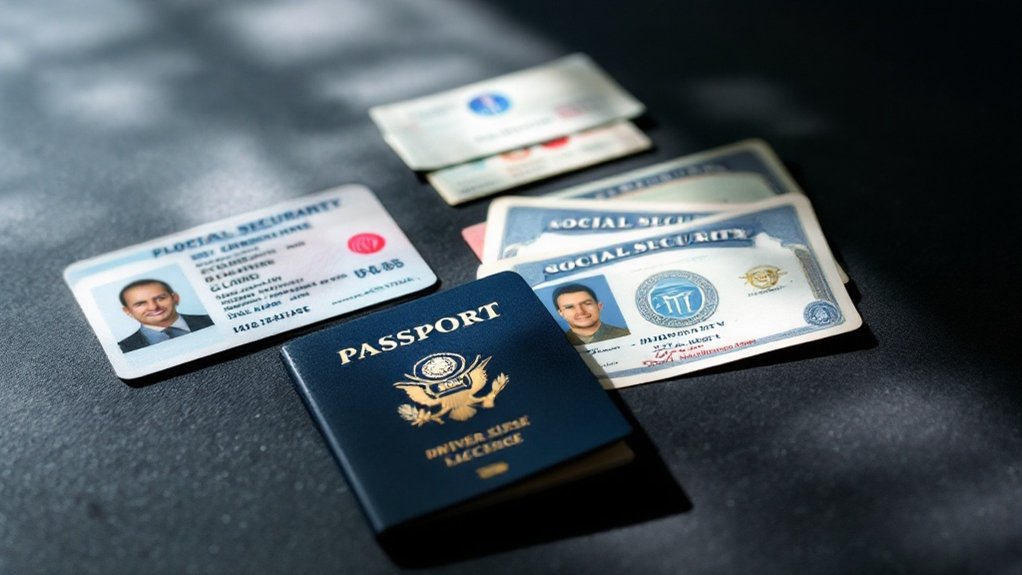When undergoing a fingerprint background check in Florida, you’ll need to provide specific IDs. Primary forms include a state-issued driver’s license or non-driver ID card, a U.S. passport or passport card, military identification cards, and Department of Defense Common Access Cards. Secondary forms might include a Social Security Card or a Certificate of Citizenship. You’ll also need to verify your residency and address. For more details on the process and regulations, you can explore further.
Primary Forms of Identification

When undergoing a fingerprint background check in Florida, you’ll need to provide primary forms of identification that meet specific criteria. These include a state-issued driver’s license or non-driver ID card, a U.S. passport or passport card, and military identification cards. Other accepted IDs are Department of Defense Common Access Cards, Federal Government Personal Identity Verification Cards, and Uniformed Services Identification Cards. Additionally, foreign passports with appropriate immigration documents, USCIS Permanent Resident Cards, and Employment Authorization Cards are valid. Specialized IDs like Global Entry Cards and Native American Tribal ID Cards are also accepted. For accurate processing, it is crucial to ensure that all documents, including the fingerprint records, are handled with precision to verify identity correctly.
Secondary Forms of Identification
To undergo a fingerprint background check in Florida, you’ll need to understand the secondary forms of identification that are accepted. These include a state/government-issued certificate of birth, US Active Duty/Retiree/Reservist Military ID Card, current passport, Social Security Card, and Certificate of Citizenship (N560). Additional secondary documents are Certificate of Naturalization (N550), INS I-551 Resident Alien Card, INS I-688 Temporary Resident Identification Card, and INS I-688B, I-766 Employment Authorization Card.
When using these secondary IDs, you must provide supporting documents like a utility bill, voter registration card, vehicle registration/title, paycheck stub, or cancelled check/bank statement. These supporting documents must include your name and current address.
Special Cases and Documents

In special cases involving fingerprint background checks in Florida, certain individuals may be exempt from the fingerprinting requirement due to physical, developmental, or cognitive disabilities. To facilitate these exemptions, specific documents are required:
- Fingerprint Exemption Form: Needed for individuals seeking exemptions.
- Health Professional Documentation: Supporting evidence from a licensed professional.
- Criminal History Record Review Letter: Indicates if there are offenses prohibiting placement.
These documents guarantee that the exemption process is properly managed and that individuals’ rights are respected. Florida Statutes and federal regulations govern these procedures, ascertaining compliance and fairness in the handling of sensitive information. The use of fingerprint-based checks ensures a comprehensive review of an individual’s criminal history, which is crucial for maintaining safety in positions of trust.
Fingerprinting Process and Fees
Fingerprint background checks in Florida involve a structured process that includes collecting fingerprints using Livescan technology, which digitally captures and submits them to state and national databases, such as the FDLE and FBI. This method is efficient and eliminates traditional ink-and-paper methods. FDLE-approved service providers like Edge Information Management and FastFingerprints offer these services across Florida.
The cost of fingerprinting varies by service provider and method. For instance, IdentoGO charges around $50.75 for insurance licensing, plus local sales tax. Payments are typically made directly to the provider, and additional fees may apply for re-processing. Generally, fingerprinting fees are non-refundable. Processing times are usually between 24 to 72 hours for electronic submissions.
These checks are often required for positions that involve working with vulnerable populations, such as children or the elderly, and typically involve a fingerprint-based search of both state and national criminal records.
Legal and Privacy Considerations

As you navigate the process of fingerprint background checks in Florida, you must consider the legal and privacy implications. Florida Statutes Sections 435.04 and 435.05 mandate Level 2 background checks for positions involving vulnerable populations, ensuring compliance with state and federal regulations. You have the right to challenge any inaccuracies in your criminal history records, and employers must obtain your consent before collecting biometric data like fingerprints, ensuring your privacy rights are protected. In Florida, electronic fingerprinting is used extensively, involving the use of a scanner to capture and submit fingerprints digitally, which enhances the speed and accuracy of background checks.
Legal and Privacy Considerations
When you undergo a fingerprint background check in Florida, you’re subject to a robust legal framework that guarantees compliance with both state and federal regulations. This safeguards that your privacy is protected while maintaining the integrity of the screening process.
- Fingerprint Retention: Your fingerprints are retained for future reference and notification of subsequent arrests.
- Privacy Act Compliance: The process adheres to the Federal Privacy Act of 1974, securing voluntary submission and specific uses of information.
- Right to Challenge: You have the right to challenge the accuracy of your criminal history records.
Data Protection
In Florida, the process of collecting and retaining fingerprint data for background checks is governed by a robust legal framework that safeguards both state and federal compliance. You must consent to the collection and retention of your fingerprints, which are submitted electronically to the Florida Department of Law Enforcement (FDLE) and then to the relevant agency. The FDLE and FBI retain fingerprints for future comparisons, allowing ongoing checks against new submissions.
Your privacy is protected under the Privacy Act of 1974, which governs the disclosure of fingerprint data. While disclosure may occur without consent under certain conditions, you have the right to challenge the accuracy of your criminal history records and obtain a copy of them from the screening agency.
Residency and Address Verification
To undergo a fingerprint background check in Florida, you must meet specific residency and address verification requirements. As a Florida resident, you’ll need to register for LiveScan, while out-of-state applicants can use LiveScan or submit fingerprint cards by mail if no location is nearby. You must provide accurate demographic information, including your address.
- Accurate Demographics: Confirm your address and other details are correct.
- Profession Identification: Clearly state the profession for which you’re seeking licensure.
- Application Completion: A completed application is necessary alongside fingerprint submission.
Additionally, when submitting fingerprints, it is crucial to provide two forms of identification, one of which must include a picture and signature, to ensure the process is completed successfully.
Compliance With State and Federal Regulations**

As you navigate the fingerprint background check process in Florida, you must comply with state regulations, such as Florida Statutes Section 435.04, which requires electronic submission of fingerprints to the Department of Law Enforcement. You will also need to adhere to federal regulations, including having your fingerprints searched against the FBI database as part of a national background check. Additionally, you should be aware of your rights under federal regulations, such as those outlined in Title 28 of the Code of Federal Regulations, which allow you to challenge the accuracy of background check reports.
Compliance With State and Federal Regulations
Florida’s fingerprint background check process is designed to comply with both state and federal regulations, guaranteeing a thorough and secure screening process. You will need to adhere to specific guidelines to ascertain your application is processed correctly.
- State Regulations: Florida requires fingerprinting for various licenses, with results valid for one year for new applicants and four years for previously fingerprinted individuals.
- Federal Involvement: The FBI processes fingerprint results as part of an inclusive background check.
- Data Privacy: Fingerprint data is not shared between agencies or states, adhering to federal regulations.
Legal Requirements
When undergoing a fingerprint background check in Florida, you must comply with specific legal requirements that guarantee the process is both thorough and secure. Fingerprinting is mandatory for most licenses and certifications, with LiveScan being the preferred method for electronic submission. You must use an approved Livescan service provider, ensuring the correct Originating Agency Identification (ORI) number is used to direct results to the relevant department. Fingerprints are processed faster with LiveScan compared to traditional cards, which are used for out-of-state applicants or when LiveScan is unavailable. Results are not shared with other agencies or states, maintaining privacy and security.
Federal Compliance
To certify compliance with both state and federal regulations, fingerprint background checks in Florida involve a rigorous process. You must submit your fingerprints to the Florida Department of Law Enforcement (FDLE) for state checks and to the Federal Bureau of Investigation (FBI) for federal checks.
- FBI Checks: Federal background checks require fingerprint submission to the FBI.
- State and Federal Databases: Level 2 background checks search both state and national databases.
- Federal Standards: Accurate and secure fingerprint collection and transmission are obligatory.
These standards verify privacy protections and secure data handling.
Conclusion
As you navigate Florida’s fingerprint background checks, remember that the meat is in the small things. You’ll need primary IDs like a state-issued driver’s license or U.S. Passport, and secondary IDs such as a utility bill or Social Security card. Guarantee at least one ID shows your current address. The fingerprinting process involves LiveScan or card submissions, with fees varying by vendor. Compliance with state and federal regulations is vital for a smooth process.

